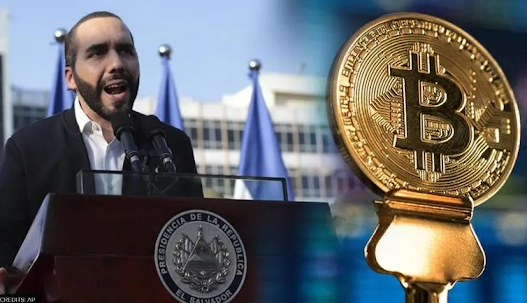Around the world, bitcoin has a mixed reputation. Owning and using
cryptocurrencies or cryptocurrencies is legal in most countries, tolerated
in many, and prohibited by a few others.
El Salvador recently became the first country to officially adopt
cryptocurrencies as legal tender, and several other Latin American leaders
have indicated they will follow suit. This is a significant change for
bitcoin's reputation on the world stage.
Powered by a technology called “blockchain” or digital ledger, bitcoin
holders enjoy a fast and secure way to make payments or receive funds. And
El Salvador clearly has a need to receive funds quickly.
Like many other countries, El Salvador's economy relies heavily on
“remittances”, funds sent by citizens working abroad. Total remittances into
El Salvador accounted for more than 20% of its economy in 2019.
Currently remittances are made through Western Union or other remittance
services which are of course centralized and highly regulated. Sending funds
can be tricky, involving an in-person visit to the agency's office and proof
of the identity of the sender and recipient. Although there are more than
500 Western Union offices in El Salvador, it is still not easy for those
living in rural areas.
In contrast, cryptocurrencies such as bitcoin allow anyone with a mobile
phone to send or receive funds, regardless of location. A software
application known as a “portmanteau” or digital wallet that manages
cryptocurrencies according to the needs of their users. Such digital wallets
are protected on the phone through a password or a biometric mechanism such
as a fingerprint.
Bitcoin recipients can receive their funds by connecting to the internet.
Once bitcoins are received, there are several ways to exchange
cryptocurrencies for cash.
An illustration of several hands holding smartphones, with an image of
bitcoins being transferred between them. El Salvador could be the first
country to adopt bitcoin as a legal tender.
El Salvador has gone a step further in using the relatively easy and fast
bitcoin transfer, by accepting it as a legal tender. Cryptocurrencies can be
spent directly on goods and services, much like the US dollar in El
Salvador. Other Latin American politicians have also called for the adoption
of bitcoin as a legal tender.
In El Salvador, about 70 of its citizens are unbanked, meaning they do not
have access to a bank account. We know that unbanked people face tremendous
challenges both in saving and collecting their money.
Those without a bank account are discouraged from saving for at least two
reasons.
First, holding cash is risky. Bitcoin wallets, however, protect
savings through a password or Leg, naturally facilitating small, regular
savings over time.
Second, savers are rewarded by receiving interest on their money.
Without these incentives there is little to gain from savings. But there are
companies that allow bitcoin holders to receive interest on their
cryptocurrency (even if your funds are not protected if they stop trading).
So bitcoin holders can enjoy bank services, without needing to open a bank
account. The desire to help the unbanked may well be imitated by the rest of
Latin America, but bitcoin's ability to send and receive payments quickly
may also be of interest.
Weaknesses
Adopting bitcoin as a legal tender is not without its downsides.
Cryptocurrencies are notoriously unstable; at the time of writing Bitcoin
has fallen in price by roughly 50% from its April 2021 high of nearly
$65,000.
I hold bitcoins, and see this drop in price as part of the risk of the
investment (hopefully there will be rewards to come). But I also don't have
all my savings in bitcoin. If I did, my reaction would be very different.
Also worrying is the existence of so-called “Goliath” or “whales”, those who
control wallets with large amounts of bitcoins. There are approximately
2,000 wallets each containing over 1,000 bitcoins.
It is not known who controls this wallet, but if some whales decide to sell
their bitcoins, there is likely to be a tremendous price drop.
Another problem that El Salvador and other adopters will face is the
inherent deflationary design of bitcoin. The supply of traditional
currencies such as the US dollar can be changed according to economic
conditions. America's central bankers manage the money supply to stimulate,
or slow down, the economy as needed. And historically the supply of US
dollars has increased to reflect population growth.
In contrast, the total bitcoin supply remains at 21 million coins. At the
time of writing only about a million bitcoins are left to mine. While the
price of bitcoin will definitely go down over time.
Also, many analysts expect the price of bitcoin to rise over time, as
acceptance and demand increase amid falling supply. If the more bullish or
optimistic price forecasts for bitcoin are correct, those of El Salvador who
were lucky enough to acquire and hold bitcoins early could become rich,
perhaps very rich. This has happened to those lucky enough to buy bitcoin
before 2010, when it cost less than a dollar.
Lastly, there are growing concerns about bitcoin's environmental impact that
could be considered. While it is not clear how this issue will be resolved,
it should be evaluated as part of the decision to make bitcoin legal.
Considering these risks, one can only wonder why El Salvador has not
considered the adoption of so-called “stablecoins”. By design, stablecoins
like Tether are set at one US dollar.
Stablecoins offer security and fast bitcoin transmission speeds, but without
the volatility, or lottery-like rewards for early adopters.



